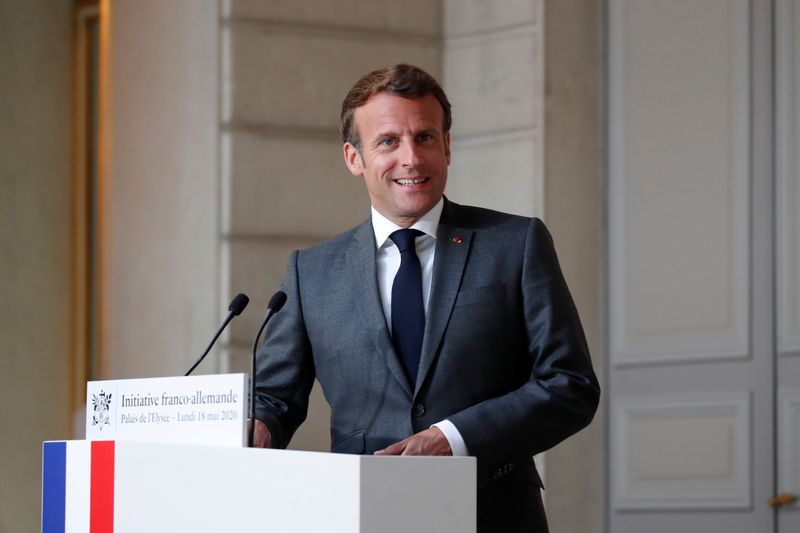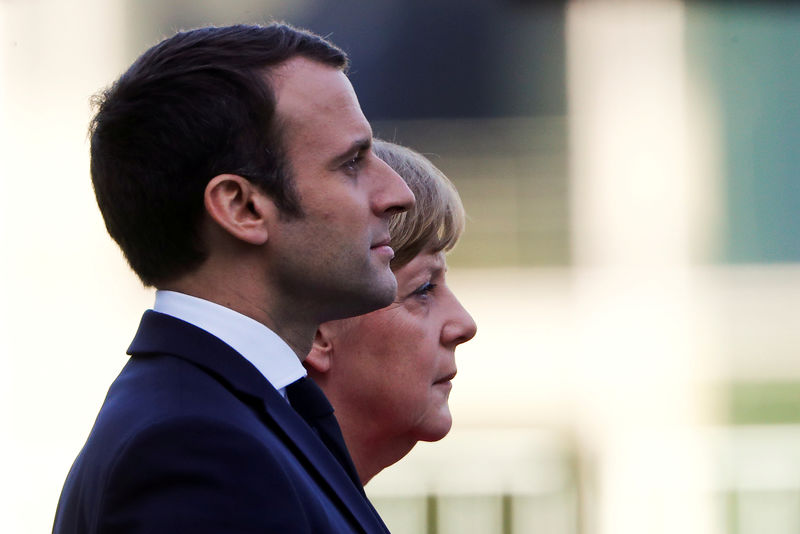By Michel Rose and Michael Nienaber
PARIS/BERLIN (Reuters) - France and Germany proposed on Monday a 500 billion euro ($543 billion) Recovery Fund that would offer grants to European Union regions and sectors hit hardest by the coronavirus pandemic, pushing up the euro and bringing down Italian bond yields.
The two biggest EU countries, whose agreements usually pave the way for broader EU deals, proposed that the European Commission borrow the money on behalf of the whole EU and spend it as an additional top-up to the 2021-2027 EU budget that is already close to 1 trillion euros over that period.
"That's a real change in philosophy," French President Emmanuel Macron said. "I believe this is a very deep transformation and that's what the European Union and the single market needed to remain coherent. It's what the euro zone needs to remain united."
The proposal moves the EU more in the direction of a transfer union and is likely to please countries like Italy or Spain which have long called for more joint action in response to the crisis.
But offering grants rather than loans could be hard to swallow for some of the frugal northern countries of the 27-nation bloc, like the Netherlands, Finland and Austria.
"Our position remains unchanged. We are ready to help most affected countries with loans," Austrian Chancellor Sebastian Kurz said on Twitter. "We expect the updated (EU budget) to reflect the new priorities rather than raising the ceiling."
The euro jumped against the dollar (EUR=) to 1.0912 from 1.0851 on the news and bond yields in Italy, one of the hardest hit by the pandemic and which has a huge public debt, fell to a one-month low of 1.67% from 1.79% (IT10YT=RR).
Still, grants from the Recovery Fund will have strings attached - they are to be "based on a clear commitment from Member States to follow sound economic policies and an ambitious reform agenda" the document said.
The money is to be spent particularly on investment in the EU's transition to a more "green" and digital economy and boost research and innovation.
It is to be paid for through the EU budget that will come after 2027, the Franco-German document said.
France and Germany did not specify whether that would mean higher national contributions based on the size of each economy or some new taxes that would be earmarked for the EU, or a combination of both.
German Chancellor Angela Merkel said the 500 billion euros should be paid back over a long time and that Berlin would shoulder roughly 27% of the funds, as it already does for the regular EU budget.
"We must act in a European way so that we get out of the crisis well and strengthened," Merkel told reporters.
'CLOSE COOPERATION'
France and Germany had previously struggled to present a united front in the coronavirus crisis as France lead a push by mostly southern countries to get fiscally conservative northerners, including Germany, to issue joint European debt to help them recover from the deepest ever recession, which is now expected to come this year.
Macron said the plan was a result of "close cooperation" with Italy and the Netherlands - diplomatic language indicating the two countries had been consulted.
"We will consider proposals and ideas like the French and Germans have done. Eventually there must be a proposal from the European Commission and that will be the starting point for the discussions," said Stephan Schrover, a spokesman for Dutch Prime Minister Mark Rutte.
The European Commission is to present its own proposal for a Recovery Fund linked to the EU's next long-term budget on May 27th and said it welcomed the initiative from Paris and Berlin.
"It acknowledges the scope and the size of the economic challenge that Europe faces, and rightly puts the emphasis on the need to work on a solution with the European budget at its core," Commission head Ursula von der Leyen said.
"This goes in the direction of the proposal the Commission is working on which will also take into account the views of all member States and the European Parliament," she said.
The European Parliament has called in a resolution for governments to assign new, dedicated revenue streams to the EU budget so that it can pay back the money the Commission would borrow to pay for the grants.

Among possible new revenue sources for the EU budget, which now gets its money from national contributions, a cut of national VAT and customs and sugar levies, the parliament has listed a plastics tax, a digital tax, a financial transactions tax and a levy on goods imported into the EU from countries that have lower CO2 emissions standards than the EU.
